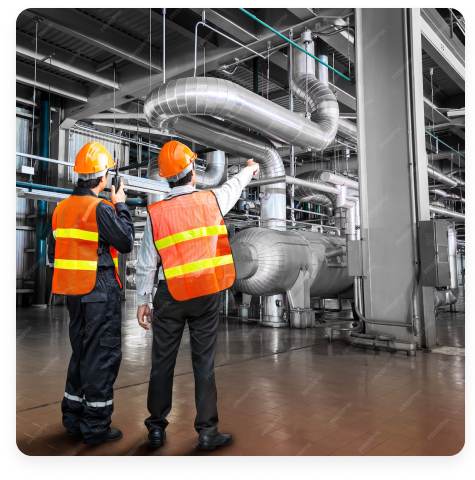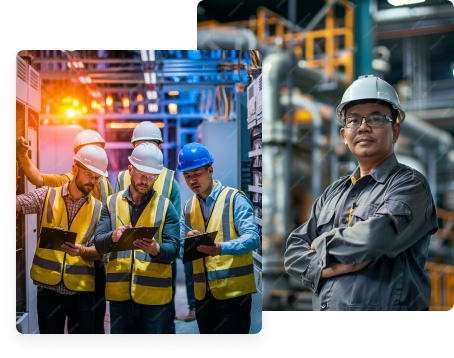Shell and Tube Heat Exchangers: Mechanical Design (ASME/TEMA), and Considering Operations & Maintenance
Shell tube heat exchanger course covers mechanical design, considering operations and maintenance. This 5-day training will be held in Indonesia & Malaysia
Level
Intermediate
Type
Facetoface

Trusted by Leading Companies
Our training programs are promoted to engineers, supervisors, and technical teams across the globe, supporting their continuous development and operational competency.












About Training
This Five-day program offers a proper understanding of the ASME/ TEMA codes and standards, pertaining to mechanical design engineering, inspection, and testing of the shell and tube heat exchangers and their relevant referred codes. This course emphasizes understanding of ‘stated’ and ‘implied’ requirements (i.e. content and intent) of the codes. The participants would be explained in detail the application of these code/ standard rules and mechanical design formulas for different design conditions and services.
ASME Section VIII/ TEMA are very commonly adopted guidelines that are comparatively easier to use, in comparison to BS/ DIN/ other codes and standards.
This course is intended to give the participants the confidence for carrying out design, maintenance, and testing for shell and tube heat exchangers and also will help to carry out strength calculations and assessment of the integrity of existing exchangers. How to adopt code rules for different types of exchangers and with various service conditions will be illustrated with case discussions. Important code stipulations will be reviewed and discussed collectively with participants so as to address the difficulties and ambiguities they might have encountered during their work. This course will also help the design engineers to assess the work of the fabricators/ vendors as regards drawing and calculation review/ approval.
Over and all the course will make the attendees comfortable with the use of ASME/ TEMA codes and standards and understand the basic concepts with better clarity. This will give the candidates a firm background for further studying in-service codes/ standards such as API-579, ASME PCC-2, or API-510.
Training Objectives
What is Shell and Tube Heat Exchangers training course objective?
- Familiarize participants with the concepts and technical terms of the codes.
- Know the basic concepts of the codes and their design fundamentals.
- Understand salient features and differences between codes and standards.
- Know the design of pressure parts and major components.
- Understand the problems in exchangers in-service & corrosion-related issues.
- Learn the maintenance aspects of shell & tube exchangers.
- Get introduced to the repair techniques and considerations.
- Discover the fabrication requirements, assembly, and welding requirements.
- NDE and Inspection procedures
- Pressure testing.
Audiences
Who should join Shell and Tube Heat Exchangers training course by PetroSync?
The course is designed for, but not limited to, mechanical design, operations, maintenance, and inspection professionals who are involved in equipment such as pressure vessels, heat exchangers, process columns, etc.
Job Title Includes:
- Design Engineers / Managers
- Mechanical Engineers / Managers
- Maintenance Engineers / Managers
- QAQC Engineers / Managers
- Inspection Engineers / Managers
- Reliability Engineers / Managers
Instructor
MM
Mandar Mulay
Mandar Mulay has about 20 years hands on experience in design and integrity assessment of Piping Systems, Reactors & Storage Tanks, Pressure Vessels, Power Boiler, and Heat Exchanger. He is well conversant with the major industry codes & standards such as ASME Sec. I, ASME B 31.1, B31.3 , B31.4 and B31.8, ASME Sec VIII, BS-5500, TEMA, API -650, IS 803, API 579, ASME PCC-2 etc.
Major projects closely associated with, in his professional career so far are, Qatar Chemicals, Shell, Castrol India, Reliance Industries, Cargill Foods USA, etc. His proficiency in Power Boiler, Piping and Pressure Vessel Codes enables him to trace the similarities and differences of these codes. He also actively involved as Instructor for programs on the subjects of ASME codes, Integrity Assessment, Fitness for Service, etc.
Along with his career in Engineering and Design Department in a multinational company at a very senior post for the last 20 years, he is also visiting faculty to a well known Engineering College in India for their P.G. Courses in Piping Design and Engineering
Apart from being visiting faculty, He has also conducted several Training Courses ( ASME Sec. I, ASME Sec. VIII, ASME B 31.3 Piping Codes , API 579 FFS code, ASME PCC-2 Repair practices, and Heat Exchanger Design Operations & Maintenance ) in Saudi Arabia, Qatar, Bahrain and UAE for engineers from companies like Saudi Aramco, SABIC group of Companies, Qatar Petroleum, ADNOC, BAPCO, DEWA, Gulf Petrochemicals etc. He has already conducted many times the training courses in API 579, where the participants rated him “Excellent” for these courses.
Daily Aims
- Importance of Heat Transfer
- Categories of heat exchangers such as Plate type/ Double pipe/ Cooling towers/ Air cooled exchangers
- Modes of heat transfer such as conduction/ convection/ radiation
- Introduction to Fluid Flow, velocities and Pressure Loss
- Applicability of relevant codes under ASME/ TEMA/ API
- Introduction and considerations in Thermal Design
- Material selection criteria from ASME Section-II
- Heat Exchanger Terminology as per TEMA/ ASME
- Types such as Fixed/ Floating/ U tubesheet and applications
- Shell-And-Tube Heat Exchanger parts and detailed function
- Mechanical design & thickness calculations as per ASME-VIII (Internal/ External pressure) for shells/ bonnets/ tubes
- Minimum thickness criteria from TEMA
- Tube Layouts and Number of Tubes in specified Shell Diameter (for ease of maintenance)
- Exercise on (basic) thermal design of the exchanger
- Thickness calculation for Tubesheet (Bending/ Shear) from TEMA.
- Minimum requirement criteria for baffles/ tie-rods/ tubes/ flanges/ impingement plates/ etc.
- Baffles clearance and spacing with consideration to flow induced vibrations
- Tube Layouts and Number of Tubes in specified Shell Diameter (for ease of maintenance)
- TEMA Standard References.
- General introduction to API Standard for Petroleum and Natural Gas Industries
- Case Study/ exercise on design using TEMA criteria
- Inspection considerations (Radiography/ Ultrasonic/etc.)
- Heat Exchanger Hydrostatic test/ Pneumatic test
- General reference from ASME Section-V and ASME Section-IX
- Corrosion and Fouling in Heat Exchangers
- Maintenance and Cleaning Methods
- Preventive & Corrective Maintenance
- Effects of tube failure/ bad design on operation of the exchanger
- Concept of MAWP
- Repair minimum requirement criteria from ASME PCC-2
- Retubing/ tube pulling/ plugging (friction/ mechanical plugs) of tubes
- Case study from ASME PCC-2 philosophy
- Final heat exchanger selection based on
- Type of Duty
- Operating Limitation
- Materials of Construction
- Safety and Reliability
- Design Methods
- Inspection of new Heat Exchangers during fabrication
- Dimensions and Weight
- Cost
- Delivery
- Review of a real life typical fabrication assembly drawing/ calculations/ specification data sheet
- Discussions and queries
- Final Exam (if required)
Training Schedule
| Code | Start Date | End Date | Locations | Cost | Instructor |
|---|---|---|---|---|---|
| PST0397-202601 | 06 Apr, 2026 | 10 Apr, 2026 | Kuala Lumpur, Malaysia | USD 3350 | Mandar Mulay |
| PST0397-202602 | 07 Sep, 2026 | 11 Sep, 2026 | Kuala Lumpur, Malaysia | USD 3350 | Mandar Mulay |
Why Choose This Training
Credibility
Align with API/ASME standards. Trusted by major operators.
Expert Instructors
Led by industry veterans with real field experience.
Real Case Studies
Practical application of concepts through real world scenarios.
Practical Skills
Hands on calculations and decision making for FFS outcomes.
Trusted by Operators
Delivered to Aramco, ADNOC, SABIC, and other major operators.
Global Training Standard
Recognized across major industries by PetroSync's proven approach.
Professional Training Aligned with Industry Standards
Practical, industry ready training designed for real work environments
Limited seats available

Frequently Asked Questions
-
Direct Transfer
PetroSync Global Pte Ltd Bank Details:
- Account Name: PetroSync Global Pte Ltd
- Bank Name: DBS Bank Ltd
- Bank Code: 7171
- Bank Swift Code: DBSSSGSGXXX
- Branch Code: 288
- Account No: 0288-002682-01-6-022 (USD)
- Bank Address: 12 Marina Boulevard, Level 3, Marina Bay Financial Centre Tower 3, Singapore 018982
-
Terms & Conditions:
- For payment via direct telegraphic transfer, clients must bear both local and overseas bank charges.
-
Credit Card:
Terms & Conditions:
- A 4% credit card processing fee applies for credit card payments.
- Delegates who cancel after the training has been officially confirmed via email are required to pay the full course fee, and no refunds will be granted. However, you may substitute delegates at any time as long as reasonable advance notice is given to PetroSync.
- If PetroSync cancels, postpones, changes the trainer, or alters the training location (classroom/virtual) for any reason, and the delegate is unable or unwilling to attend on the rescheduled date, a 100% credit voucher of the paid contract fee will be issued. This credit voucher can be used for another PetroSync training program, subject to mutual agreement, within one year from the postponement date.
- PetroSync is not responsible for any loss or damage resulting from the cancellation policy and assumes no liability if the event is canceled, rescheduled, or postponed due to force majeure (e.g., natural disasters, war, government actions, industrial actions).
If PetroSync cancels, postpones, changes the trainer, or alters the training location (classroom/virtual) for any reason, and the delegate is unable or unwilling to attend on the rescheduled date, a 100% credit voucher of the paid contract fee will be issued. This credit voucher can be used for another PetroSync training program, subject to mutual agreement, within one year from the postponement date.
Yes, participants who complete the training will receive either an attendance certificate or a completion certificate, depending on the course requirements.
Yes, PetroSync courses adhere to international standards , with expert instructors in fields such as API, ASME, Reliability, and Drilling & Well Engineering.
Yes, PetroSync certificates are widely recognized and can be used to fulfill professional development and certification requirements across various industries.
Yes, PetroSync offers customized training programs tailored to your organization's specific needs (In-house Training).
Participants will receive comprehensive training materials , including slides, handouts, and direct learning from experts with case studies related to the training topic.
PetroSync trainers are industry experts with extensive experience as instructors and consultants in their respective fields, providing professional training with a strong background in the industry.
Yes, trainer profiles, including their qualifications, experience, and expertise, are available on the website: https://www.petrosync.com/training/.
Online training sessions are conducted via user-friendly platforms such as Zoom Premium.
To access PetroSync Online Training, participants need:
- A computer or laptop (tablets or smartphones are not recommended)
- A reliable broadband internet connection (minimum 4 Mbps)
- A webcam and a headset
- Any internet browser (Chrome browser recommended for a better experience)
- A reasonably quiet place
Yes, PetroSync provides live Q&A sessions with instructors to address real-world challenges encountered during training.
The average number of participants varies depending on the topic and participants’ schedules.
- The information you provide will be safeguarded by PetroSync and may be used to keep you informed of relevant products and services.
- As an international group, we may transfer your data globally for the purposes indicated above.
- If you do not wish to share your information with other reputable companies, please tick the box on the registration form.
Please fill out the form on the designated page first. Our team will reach out to you within a maximum of 2x24 hours.
The latest training schedule is available on the website: https://www.petrosync.com/training/.
